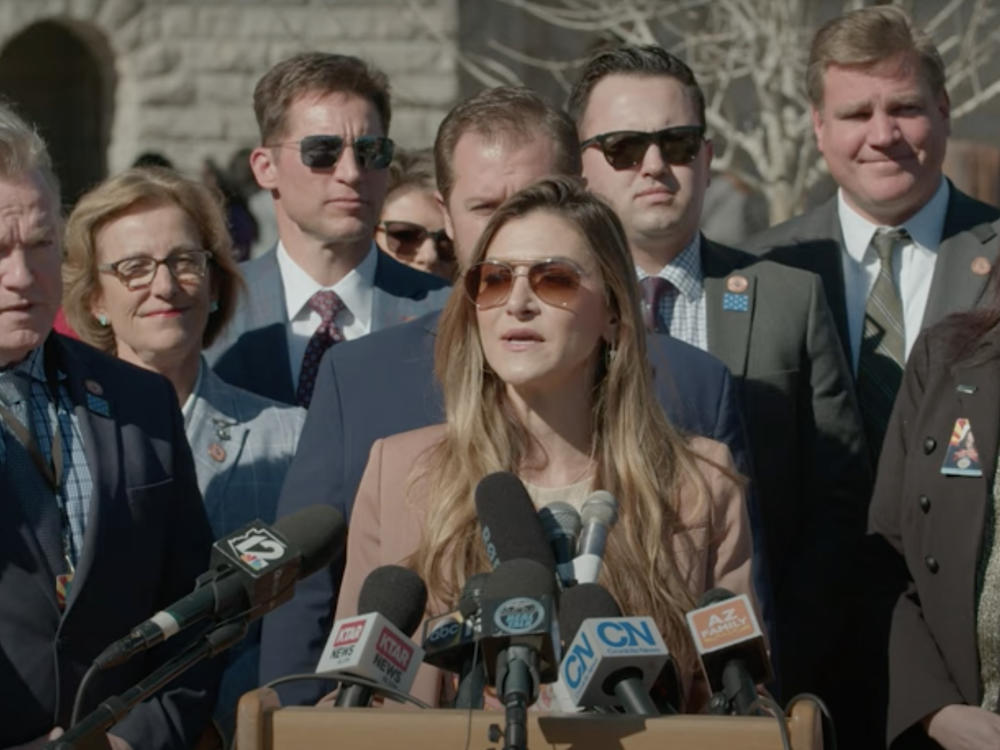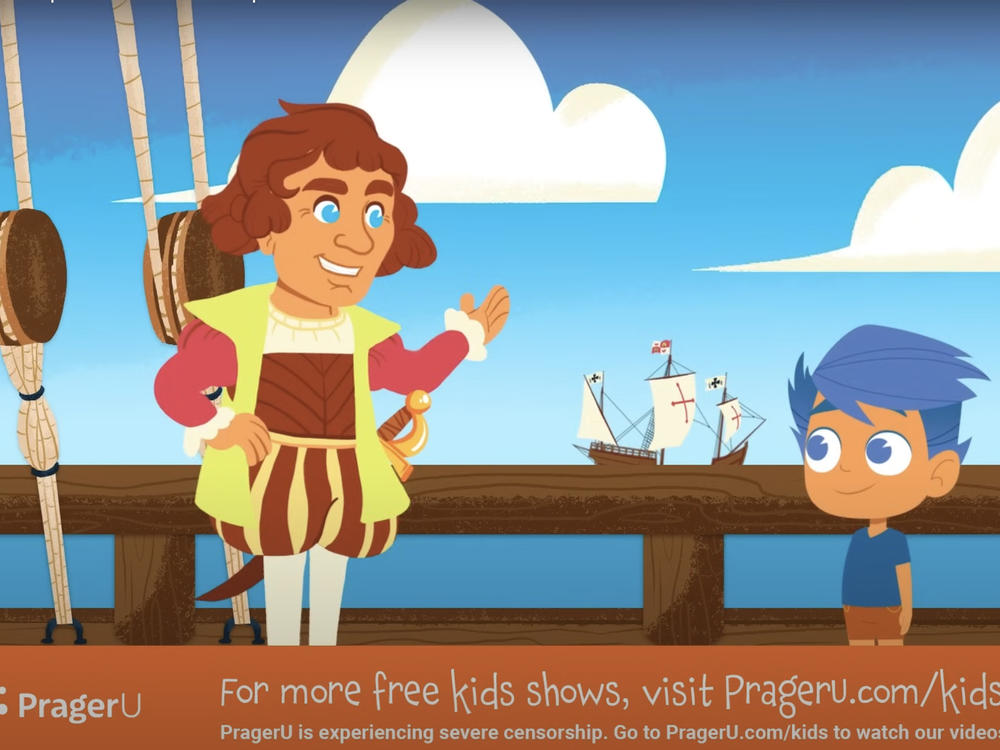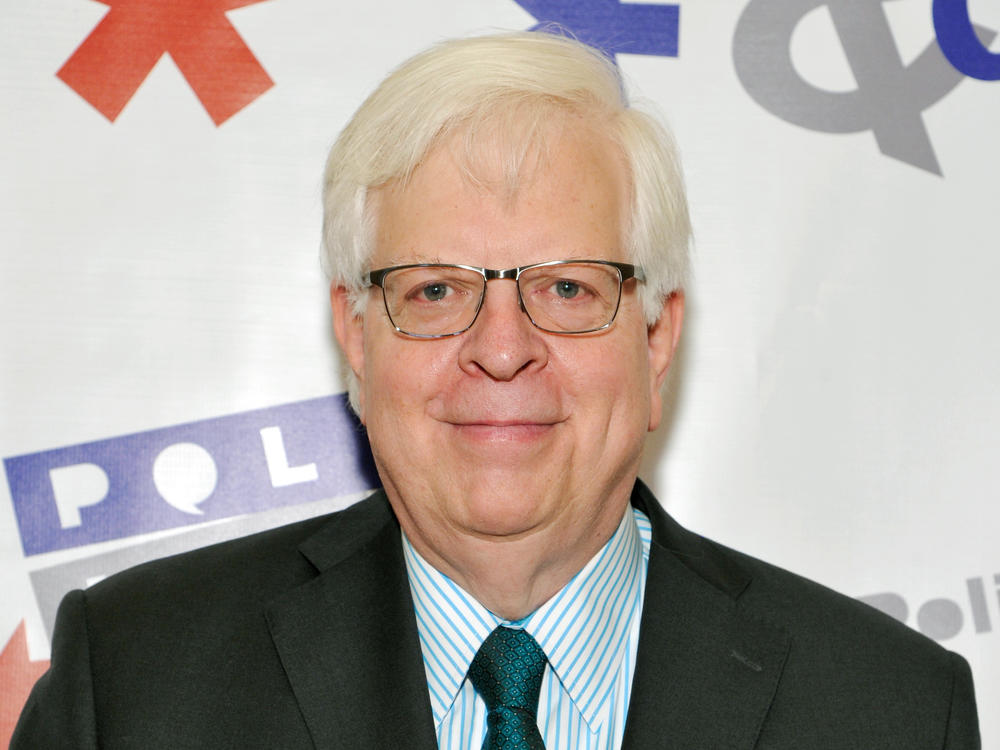Section Branding
Header Content
PragerU is a conservative video giant. Here's why it's trying to get into schools
Primary Content
Despite the suggestive sound of its name, PragerU is not a university. It's a content creator. The conservative media nonprofit makes short, well-produced videos crafted to appeal to college students and young people. It has polished animations and titles like "What Radical Islam and the Woke Have in Common" and "Is There Really a Climate Emergency?"
Recently, news headlines have focused on its PragerU Kids content.
Arizona recently became the latest state where education officials have embraced online videos produced by PragerU. It follows at least four other states that approved Prager's material for use in public school classrooms last year, though it's unclear how many students have watched these videos.
In a podcast interview last fall, the group's CEO, Marissa Streit, argued that the U.S. education system is "a left-wing propaganda machine" that teaches students to hate America. PragerU Kids, she says, is the supposed inoculation.
"PragerU shows up everywhere with medicine for the mind so that we can cure and help people think clearly," said Streit.
Educators have voiced alarms about the tone and accuracy of some of PragerU's videos, such as one that features an animated Christopher Columbus saying: "Being taken as a slave is better than being killed, no? I don't see the problem."
PragerU officials have said the video accurately portrays what Columbus would have felt about slavery. Cartoon Columbus goes on to scold two time-traveling kids for judging him based on current-day thinking about slavery.
The group markets its thousands of videos as nonpartisan explorations of big ideas. But that's a misleading framing, according to Eliah Bures with the University of California, Berkeley's Center for Right-Wing Studies.
"It's always tilted relentlessly in a single ideological direction," said Bures. "You would come away from it thinking that the position that's just been laid out is the only one that reasonable, sane people could ever possibly hold."
In a statement to NPR, PragerU responded to critics who question its neutrality: "It appears that any material that contradicts the left's narrative cannot be permitted because their arguments don't stand up to scrutiny, even just five minutes' worth."
Running a nonprofit like a business
PragerU's namesake is Dennis Prager, a longtime conservative radio host from Los Angeles. The idea to start a "university" came from Prager's wealthy fans on a cruise he held with listeners, but that was an expensive prospect and would graduate only small classes of students. Instead, PragerU's founders opted to reach people with short videos.
Within a few years, the nonprofit was getting multimillion-dollar donations from funders including Dan and Farris Wilks, brothers who made billions from natural gas fracking and who argue that climate change is God's will.
In 2022, tax records show, PragerU pulled in more than $65 million in donations. Streit, in the podcast interview, said she runs PragerU more like a business than a nonprofit.
She said it's a model that has led her to pour millions of dollars into advertising. In recent years, PragerU's marketing budget has hovered at about half of its expenses.
"And that is our secret sauce. We realized very early on that what is the point of building a beautiful car if you never put any gasoline in it?" Streit said.
Influencers or educators?
Last year, that strategy grew to include partnering with conservative state education officials. In Florida and Texas, wealthy supporters helped facilitate these introductions, according to email records NPR obtained.
"I'd like to introduce you to Manny Diaz, Jr., Florida Commissioner of Education. I met Manny and his wife Jennifer at the inaugural for Governor DeSantis. The Diaz family are big PragerU fans, so we had a very positive conversation about a potential opportunity to bring some of the PragerU content into Florida public K-12 schools (and perhaps colleges?)," wrote investor David Blumberg to Streit in January 2023.
In a June 2023 email, real estate investor Richard Weekley introduced Streit to Texas education officials. "PragerU would love to show your team how they have made their high-quality content be standards-aligned and user-friendly for teachers to easily access and implement in their K-10th classrooms."
Neither Blumberg nor Weekley responded to NPR's interview requests about their emails to state officials.
PragerU has invited public officials to its studios to film ads and approve its kids videos for classroom use, according to reporting by NBC News and New Hampshire Public Radio.
"If you think of groups like PragerU as influencers instead of educators, their main goal, their claim to fame, is eyeballs. The number of views, the number of followers, the number of clicks," said Adam Laats, a former schoolteacher turned professor at Binghamton University whose research focuses on the history of American education.
He says that's a fundamentally different approach than the one most educational publishers take.
Generally, Laats said, conservatives have been regaining influence over education policy, but he's skeptical PragerU's material will make it into many public school classrooms.
He says the group's real accomplishment may be in building up a brand that ambitious, conservative officials want to be seen supporting. In Arizona recently, PragerU held a news conference with local lawmakers and education officials who lined up to praise the nonprofit.
"This partnership is about supporting the children of this state, and it furthers Arizona Republicans' commitment to fighting for the futures of every child that calls this state home," said Arizona state Sen. Jake Hoffman.
Actually reshaping what students learn in schools is a notoriously difficult process, said Laats, even for conservative curriculum developers who've spent decades building relationships with state education systems.
What these state partnerships do succeed in, Laats said, is generating headlines. That coverage gives both PragerU and public officials something to show donors and supporters, but this mutual reinforcement, Laats said, is less helpful for students.
"You know, it'd be like if a state approved, you know, Snickers bars as healthy food. Even if no students ate it, it's important for us to agree that that doesn't count as healthy food," said Laats.
PragerU is likely to announce more partnerships in as many states as it can. In a statement to NPR, it said it's working on a new early-literacy show.
The group also continues to try out new formats. Its recent short documentary debut was 20 minutes on a central preoccupation of the right: gender-affirming care.
Bottom Content



